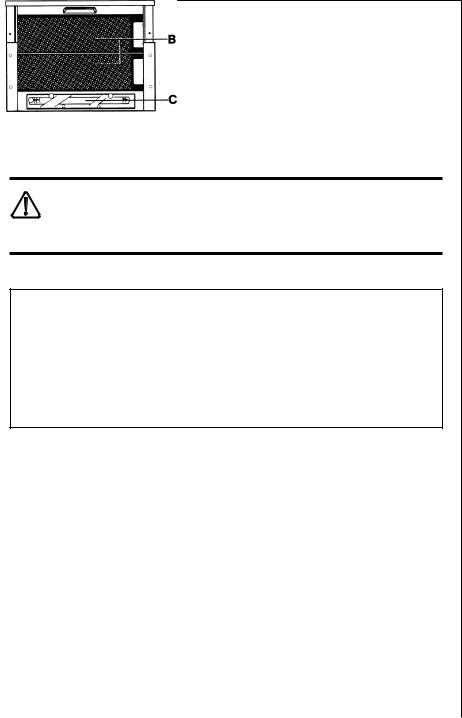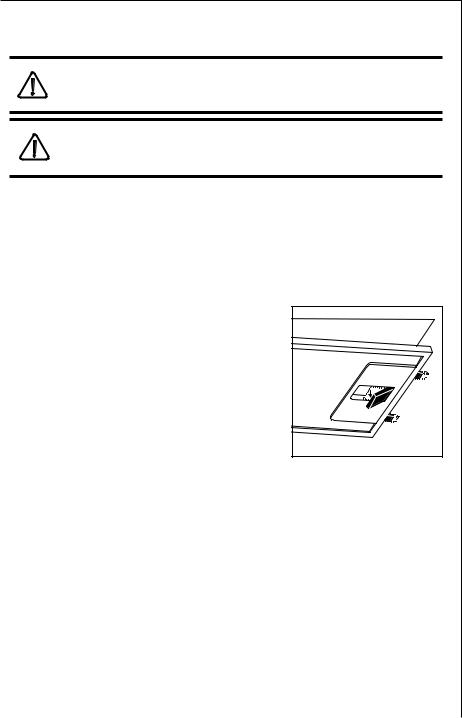AEG DF6260-ML/S Manual
DF 6260
Köksfläkt
Ventilator
Liesituuletin
Emhætte
Cooker Hood
Instruktionsbok
Bruksanvisning
Käyttöohje
Brugsvejledning
Operating and Installation Instructions

Contents |
|
Safety instructions ............................................................................ |
63 |
Description of the cooker hood .......................................................... |
65 |
Using the cooker hood ...................................................................... |
66 |
Maintenance and cleaning ................................................................. |
67 |
If the cooker hood will not operate ..................................................... |
70 |
Guarantee conditions ........................................................................ |
70 |
Technical data ................................................................................... |
71 |
Special accessories .......................................................................... |
72 |
Installation ........................................................................................ |
72 |
 Safety instructions
Safety instructions
This appliance is to be used solely as a household appliance. It has been manufactured according to the international safety and quality standards. Note that the safety devices alone are not capable of eliminating all accident risks. It is therefore very important to carefully read all the operating instructions, recommendations and warnings prior to installation and use of the appliance. Note in particular the text paragraphs with the danger triangle design, to avoid damages to persons or objects. Keep this instruction booklet in a safe place: this booklet should always accompany the appliance at such time as it is sold or given to other persons for use.
Installation and service
•Any electrical installation of the cooker hood must be carried out by a qualified electrician and the hood itself must be installed by someone with experience. Installation made by an unqualified person can lead to loss of function of the cooker hood and possible damage to person and and/or property.
•The cooker hood must be at least 47 cm above electric hobs or electric ranges, or at least 65 cm above gas burners or gas ranges.
•Ensure that the power cable is not damaged during installation.
•The cooker hood is only in stand by mode unless the plug or the fuse is disconnected.
•The cooker hood cannot be connected to flues of other appliances that run on energy sources other than electricity. Please, keep to the provisions of official directives regarding fume discharge.
63

Use of cooker hood
•This appliance is for domestic use only in a normal household.
•Never leave any deep-frying, melting fat, paraffin or any other inflammable liquid unattended on the hob. In the event of fire: Immediately switch off the cooker hood and the cooker. Note! Cover the fire. Never use water.
•Never do any flambé cooking underneath the cooker hood. It can cause a fire. Remember that overheated fat may spontaneously ignite. Never leave the frying pan unattended.
•It is essential that the grease filter is regularly cleaned to help avoid fat dripping on to the hot zone and causing a fire. Read the section
on “Maintenance and Cleaning” in the instruction book.
Disposal
• Prevent accidents when disposing of your cooker hood. Disconnect the power plug from the wall socket and cut the power cord at the hood inlet.Contact your local authority for information on where to dispose the cooker hood.
64

Description of the cooker hood
Functions
There are two possible systems:
•Extraction of air to the outside using an optional venting kit and evacuation duct.
•Recirculation using an optional
charcoal filter.
The air outlet must not be connected to chimney flues or combustion gas ducts. The air outlet must under no circumstances be connected to ventilation ducts for rooms in which fuel-burning appliances are installed.
Fig. 1
A = Switches (Motor, light)
B = Grease filter
C = Light
D = Control panel
E = Vapour catcher (Extractible)
Accessories
The following are included with the cooker hood.
•1 hood canopy complete with controls, lighting and fan motor.
•1 Adaptor Ø 150 mm.
•1 plastic bag containing: documentation, screws to fix the hood. The following can be ordered from your retailer:
•Charcoal filter, KFL 60/80 (should be replaced every year).
or
• Charcoal filter, KF8 (typ 150 – can be regenerated and should be replaced every 3 years).
The carbon filter is to be used when the hood is connected to the recirculation mode.
65

Using the cooker hood
The control panel
• The switches are arranged on the upper right side of the vapour catcher. (Fig. 1 - E). The numbers and symbols have the following meanings (from left to right):
The blower is controlled by shifting the sliding switch. The extractor part (vapour catcher) of the hood is used to
switch the blower on and off when the appliance is switched on (Motor).
=Continuously variable blower control
=Intensive setting
=Lighting
=Lighting OFF
=Lighting ON
When the vapour catcher of the appliance is withdrawn (without preceding disengagement of the hood via the switches), the set fan output is automatically re-engaged.
If the extractor part is re-inserted without operation of the switches, first the blower is switched off.
The lighting can be separately switched on and off with the sliding switch.
Best results are obtained by using a low speed for normal conditions and high speed when odours are more concentrated. Turn the hood on a few minutes before you start cooking then you will get an underpressure in the kitchen. It should be left on after cooking for about 15 minutes or until all odours have disappeared.
Correct ventilation
If the cooker hood is to work correctly there must be an underpressure in the kitchen. It is important to keep the kitchen windows closed and have a window in an adjacent room open.
Important to know
Not applicable for recirculation. Great care must be taken if the hood is used at the same time as a burner or fireplace (e.g. gas, diesel, coal or wood heaters, water heaters, etc.), as the hood will expel air which is required by these other appliances. Attend to it by opening a window. The negative pressure in the room must not exceed 0,04 mbar to prevent fumes being drawn back into the room by the cooker hood.
66

Maintenance and cleaning
Disconnect the cooker hood from the power supply prior to cleaning the appliance, either by removing the plug from the mains or removing the fuse.
Clean the filter regularly. The grease deposits in the filter and discharge tube are fire hazards where a hotplate (or another heat source) is left on by error.
Cleaning the hood
Clean the outside of the hood using a damp cloth and a mild detergent. Never use corrosive, abrasive or flammable cleaning products.
Cleaning the grease filters
Clean the filter every month or every other month according to how much the hood is used. The cleaner the filters, the more grease they collect. To remove the filters (Fig. 4):
• Pull the lock outwards and extract the grease filter. Fig. 4.
The filter is made of aluminium wires on which the grease collects. Clean the filter in hot water using a detergent, or in a
dishwasher. Let the filter dry before putting Fig. 2 it back. Note that a dishwasher may
discolour the filter.
67
